Finding the best dropshipping suppliers is crucial for aspiring eCommerce entrepreneurs seeking a low-risk, high-reward business model. Dropshipping allows you to scale your business without major investments, but success hinges on partnering with the right supplier.
We’ve analyzed the top contenders in the 2024 dropshipping landscape, comparing their costs, advantages, and key features. Join us as we explore essential concepts for researching and selecting a sustainable dropshipping service in today’s competitive eCommerce market.
Who is Dropshipping suppliers?
Dropshipping is a fulfillment model for online stores where the seller doesn’t keep the products they sell in stock. Instead, when a customer places an order, the seller purchases the item from a third-party supplier (often called a drop shipper) who then ships it directly to the customer.
Here’s how it works:
- Customer places an order: You (the seller) receive an order from a customer through your online store.
- Order forwarded to a supplier: You forward the order details and customer information to your dropshipping supplier.
- The supplier ships the product: The supplier packages and ships the product directly to the customer, using their branding and packaging (unless you have private label arrangements).
- Profit margin: You make a profit on the difference between the wholesale price you pay the supplier and the retail price you charge the customer.
Benefits of dropshipping:
- Low startup costs: No need for upfront inventory investment, minimizing financial risk.
- Wide product selection: Offer a large variety of products without managing physical inventory.
- Scalability: Easily adjust your product offerings and scale your business without inventory limitations.
- Location flexibility: Run your online store from anywhere with an internet connection.
- Reduced overhead: Save on warehouse space, inventory management, and shipping costs.
Challenges of dropshipping:
- Lower profit margins: Dropshipping typically involves lower profit margins due to wholesale pricing and reliance on suppliers.
- Less control over quality and shipping: You rely on the supplier’s quality control and shipping times, potentially impacting customer experience.
- Inventory dependence: Supplier stockouts can lead to order fulfillment delays and disappointed customers.
- Strong branding and marketing required: Stand out from the competition without physical product control and rely heavily on branding and marketing to build trust.
Overall, dropshipping can be a great way to start an online store with low overhead and minimal upfront investment. However, it’s important to understand the challenges and choose reliable suppliers to ensure customer satisfaction and business success.
How to Find The Best Dropshipping Suppliers
Finding the best dropshipping suppliers is crucial for the success of your online store. Here are some effective ways to discover reliable partners:
1. Online Directories:
- General Directories: Platforms like SaleHoo, Doba, and Worldwide Brands offer extensive directories of verified wholesale suppliers, including drop shippers, across various industries. You can filter by product category, location, and other criteria.
- Niche-Specific Directories: Sites like Inventory Source specialize in connecting businesses with dropshipping suppliers within specific niches like home goods, electronics, or apparel. This can be highly beneficial for targeted product selection.
2. E-commerce Platforms:
- Shopify App Store: Shopify offers a dedicated app store with numerous dropshipping supplier integrations like Oberlo, Spocket, and CJDropshipping. These apps typically provide seamless integration with your Shopify store for easy order fulfillment.
- Amazon and Alibaba: While not strictly dropshipping platforms, you can find suppliers on these platforms willing to dropship under certain conditions. Research thoroughly and negotiate terms before committing.
3. Industry Events and Trade Shows:
- Attend trade shows related to your niche: This allows you to meet potential suppliers in person, assess product quality firsthand, and build relationships.
- Networking with other online entrepreneurs: Connect with fellow drop shippers and gather recommendations for reliable suppliers within their networks.
4. Online Research and Reviews:
- Search online for dropshipping suppliers in your specific niche: Read reviews and testimonials from other businesses to gauge supplier reliability and customer satisfaction.
- Utilize social media groups and forums: Join online communities dedicated to dropshipping and seek recommendations or supplier experiences from other members.
5. Contact Manufacturers Directly:
- Research the manufacturers of products you’re interested in: Reach out to them directly and inquire if they drop ship or can recommend reliable dropshipping partners for their products. This can lead to higher quality control and potentially better margins.
AliExpress Alternatives
AliExpress is a large online retail platform similar to Amazon, but with a different focusy. Launched in 2010, AliExpress is designed to be a global marketplace where businesses and individuals can directly purchase products in small quantities. It serves as a platform for small and medium-sized businesses in China and other locations to sell their products to international buyers.
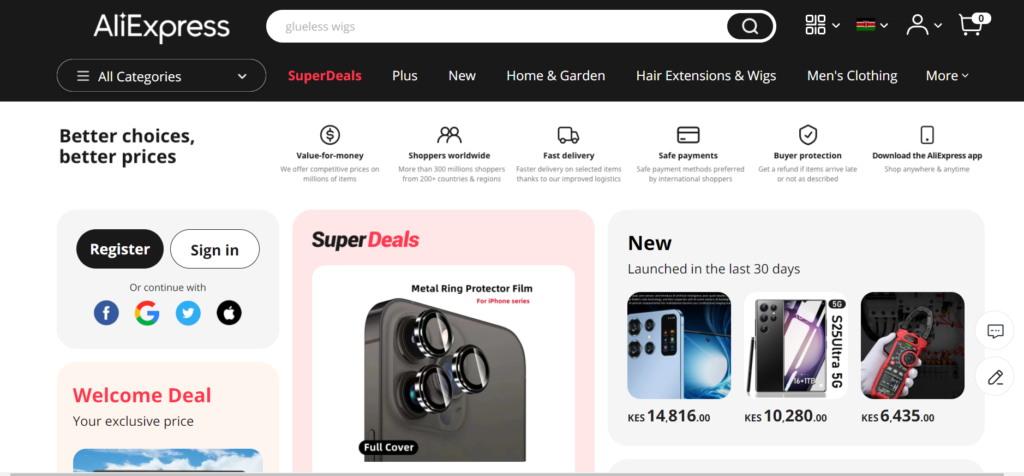
Here’s a breakdown:
Key features:
- Owned by Alibaba Group: A major Chinese multinational technology company.
- Marketplace model: Connects individual sellers (mostly based in China) with international buyers.
- Wide product range: Offers a vast selection of products across various categories like electronics, clothing, home goods, toys, etc.
- Lower prices: Generally known for more affordable prices compared to competitors like Amazon, due to factors like lower production costs in China.
- International focus: Primarily targets international buyers outside of mainland China.
Some things to keep in mind:
- Shipping times: Due to distance and customs, shipping can take longer than domestic options.
- Quality variations: Product quality can vary significantly depending on the seller. Reading reviews and checking seller ratings is crucial.
- Customer service: Customer service experience can vary, and navigating issues might be more challenging due to language and time zone differences.
What are the best dropshiping suppliers?
General Suppliers:
1. DHgate
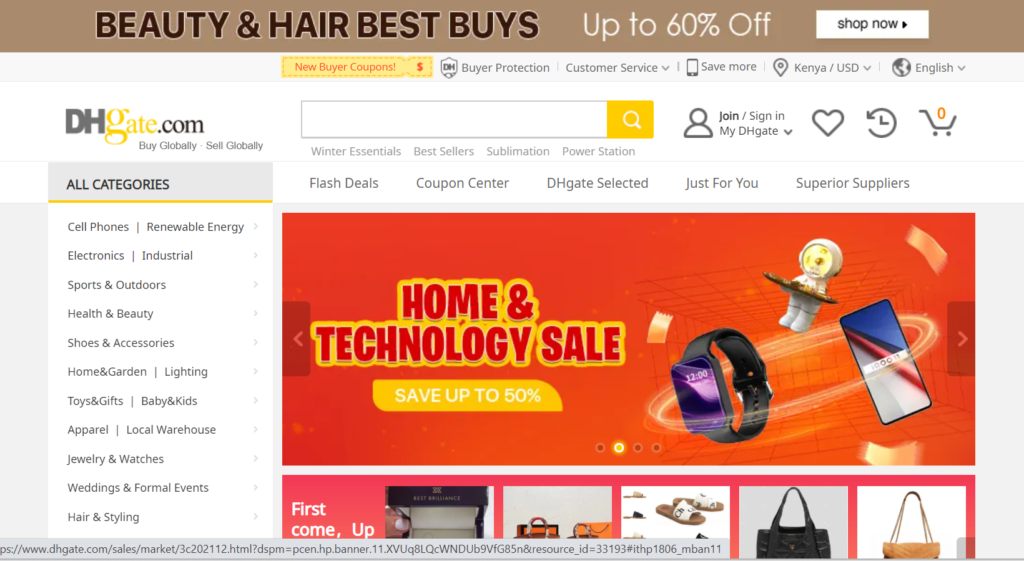
DHgate is a major online marketplace specializing in B2B (business-to-business) transactions, connecting buyers with Chinese wholesalers and manufacturers. It offers a vast selection of products across various categories, often at competitive prices. However, like any platform, it has its advantages and disadvantages to consider.
DHgate Pros:
- Wide product range: Find just about anything, from electronics and clothing to home goods and machinery.
- Competitive prices: Often lower than traditional retailers due to direct sourcing from manufacturers.
- Bulk ordering options: Ideal for businesses needing large quantities of products.
- Private label solutions: Some suppliers offer customization and branding options.
- Buyer protection programs: Minimize risk with features like secure payments and dispute resolution.
DHgate Cons:
- Quality variations: Can be challenging to assess product quality without physical inspection.
- Long shipping times: Expect delays due to distance and customs procedures.
- Communication barriers: Language and time zone differences might complicate communication with sellers.
- Minimum order quantities (MOQs): Some suppliers require bulk purchases, not suitable for small businesses.
- Counterfeit concerns: While DHgate has measures to combat counterfeiting, vigilance is crucial.
DHgate can be a valuable platform for businesses seeking cost-effective sourcing options, especially for bulk orders. However, be mindful of potential quality variations, long shipping times, and communication challenges. Carefully research suppliers, read reviews, and compare prices before committing to purchases.
2. Spocket Review
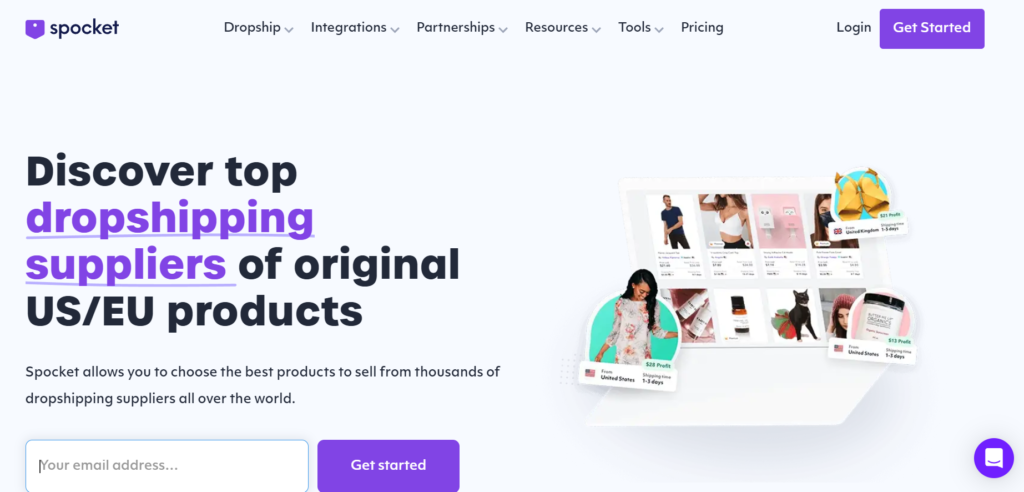
Spocket is a popular dropshipping app that integrates seamlessly with major e-commerce platforms like Shopify and Wix. It focuses on connecting businesses with US and EU-based suppliers, offering faster shipping times and potentially reducing concerns about quality compared to platforms like AliExpress. But is Spocket right for you? Let’s dive into its pros, cons, to help you decide.
Spocket Pros:
- Fast shipping times: US and EU-based suppliers often translate to quicker delivery for your customers, boosting satisfaction.
- Easy integration: Seamless plugin for popular platforms like Shopify, simplifying order management.
- Branded invoicing and packing slips: Maintain a professional brand image even with dropshipping.
- Vetted suppliers: Spocket screens suppliers for quality and reliability, offering some peace of mind.
- Variety of products: Find a wide range of products across various categories.
- 24/7 customer support: Get assistance whenever you need it.
Spocket Cons:
- Higher product costs: Generally more expensive than sourcing from some overseas suppliers.
- Profit margins: May be tighter due to higher product costs and Spocket’s fees.
- Limited product selection: Smaller pool of suppliers compared to platforms like AliExpress.
- Subscription fees: Requires a monthly or annual subscription fee, even for basic plans.
Who should use Spocket?
Spocket is a good option for:
- New dropshippers: Ease of use and vetted suppliers can be helpful for beginners.
- Businesses wanting fast shipping: US and EU suppliers offer speedier delivery.
- Those prioritizing brand image: Branded invoicing and packing slips enhance professionalism.
- Businesses selling higher-priced items: Profit margins might be less impacted by higher product costs.
Who should consider alternatives?
If you are:
- On a tight budget: Lower product costs elsewhere might be more appealing.
- Looking for a wider product selection: Other platforms offer more variety.
- Comfortable with manual supplier research: You can potentially find lower costs independently.
Overall:
Spocket offers convenience and reliability, but at a premium. Consider your budget, product needs, and brand image goals before deciding if it’s the right fit for your dropshipping business. Explore alternatives and weigh their pros and cons to make an informed choice.
3. Doba Review
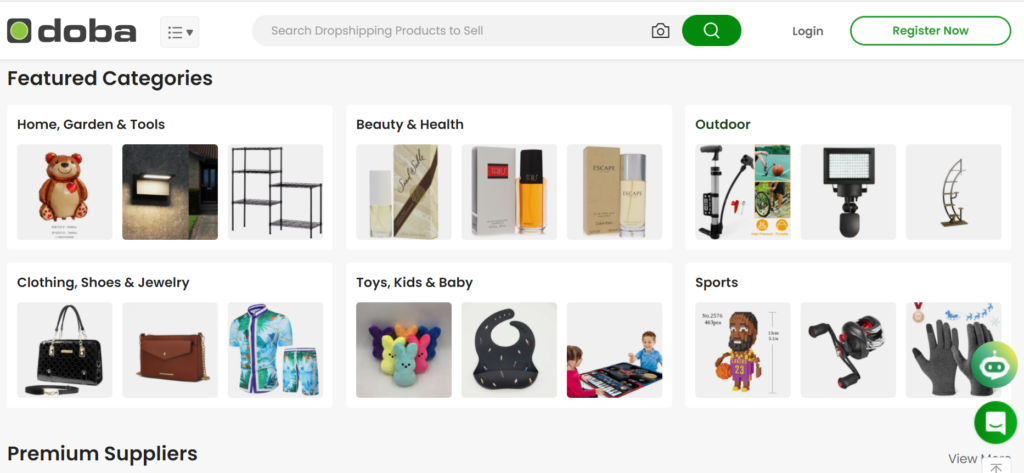
Doba has been a player in the dropshipping world for many years, but how does it fare in the current landscape? Here’s a breakdown of its pros, cons, and alternatives to help you decide if it’s worth your time and money in 2024.
Doba Pros:
- Extensive product library: Over 2 million products from various categories through its marketplace and supplier integrations.
- Advanced product research tools: Market research data and sales rank information to help choose profitable products.
- Automated order fulfillment: Integrates with major e-commerce platforms for smoother order processing.
- Private label capabilities: Branding options for building your own unique identity.
- Inventory management tools: Helps track product availability and automate reorders.
Doba Cons:
- Subscription fees: Requires a monthly subscription, which can be costly for beginners.
- Mixed supplier quality: While Doba vets suppliers, product quality can still vary.
- High product pricing: Costs may be higher than other platforms like AliExpress.
- Manual order processing: Some integrations might require manual order processing on Doba’s platform.
- Mixed reviews: User experiences vary, with some citing customer service issues and outdated interfaces.
4. Worldwide Brands Review
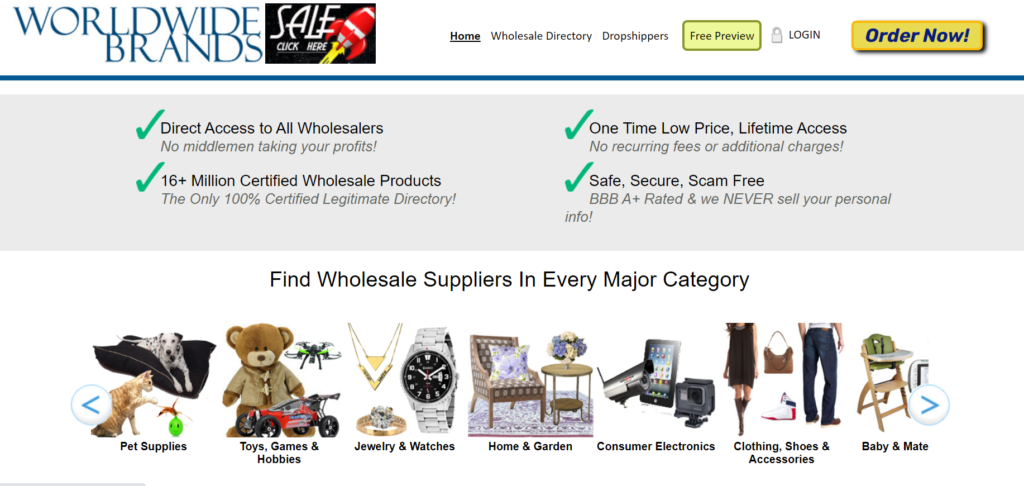
Worldwide Brands has been operating for over 20 years as a wholesale directory for dropshippers and businesses. But with the ever-evolving dropshipping landscape, does it still hold its weight in 2024? Let’s explore its pros, cons, and alternatives to help you decide if Worldwide Brands is the right choice for your dropshipping journey.
Worldwide Pros:
- Extensive product selection: Over 16 million products across various categories, giving you ample sourcing options.
- Quality focus: They claim to verify suppliers and prioritize reputable brands, potentially reducing quality concerns.
- No monthly fees: Lifetime membership eliminates recurring subscription costs, appealing to budget-conscious businesses.
- Product updates: Regular addition of new suppliers and products to keep your offerings fresh.
- Educational resources: Provides access to webinars and guides on dropshipping best practices.
Worldwide Cons:
- High upfront cost: The lifetime membership fee can be a significant initial investment compared to monthly subscriptions.
- Limited product information: You can’t view product details or pricing without contacting suppliers directly.
- Mixed user reviews: Some users report outdated interface, difficulty finding profitable products, and unresponsive customer service.
- Not dropshipping-specific: Primarily caters to wholesalers, and dropshipping features might be limited compared to dedicated platforms.
- Lack of automation: Requires manual order processing and communication with suppliers,
Niche-Specific Suppliers:
- Printful: On-demand printing for apparel, accessories, and home goods, customization options, and excellent brand-building potential.
- CJDropshipping: Focuses on dropshipping needs, private label options, and fulfillment centers in China and the US, suitable for high-volume businesses.
- Inventory Source: Integrates with various platforms, a diverse range of dropshipping suppliers across different niches, and advanced features for experienced users.
- MegaGoods: Specializes in home and garden products, fast shipping, competitive pricing, and limited product variety compared to general suppliers.
- Nihaojewelry: Focuses on fashion jewelry and accessories, a wide variety of styles, competitive prices, and minimum order quantities might apply.
It’s essential to conduct thorough research, read reviews, and possibly test a few suppliers to find the best fit for your business. Additionally, keep in mind that the dropshipping landscape is dynamic, and the popularity or reliability of suppliers may change over time. Always check for the most recent reviews and updates before partnering with a new dropshipping supplier.
FAQs About Dropshipping Suppliers
1. What is a dropshipping supplier?
A dropshipping supplier is a third-party company that stocks and ships products directly to customers on behalf of an online retailer. The retailer doesn’t have to keep inventory on hand, as the supplier ships the products directly to the customer.
2. What are the benefits of using a dropshipping supplier?
Using a dropshipping supplier can help online retailers avoid the cost and hassle of storing and shipping products. It also allows retailers to offer a wider range of products without the need for a large upfront investment.
3. How do I find a reliable dropshipping supplier?
There are several ways to find a reliable dropshipping supplier, such as using online directories, and e-commerce platforms, attending industry events, and conducting online research and reviews. It’s important to do your due diligence and thoroughly vet any potential suppliers before working with them.
4. What are some challenges of using a dropshipping supplier?
One challenge of using a dropshipping supplier is that you have less control over quality and shipping times, which can impact customer experience. Additionally, relying on suppliers for inventory can lead to stockouts and order fulfillment delays.
5. How do I negotiate pricing with a dropshipping supplier?
When negotiating pricing with a dropshipping supplier, it’s important to be clear about your needs and expectations, as well as any relevant market data or competitive pricing. Don’t be afraid to ask for discounts or bulk pricing, but be willing to compromise and maintain a positive working relationship with your supplier.




